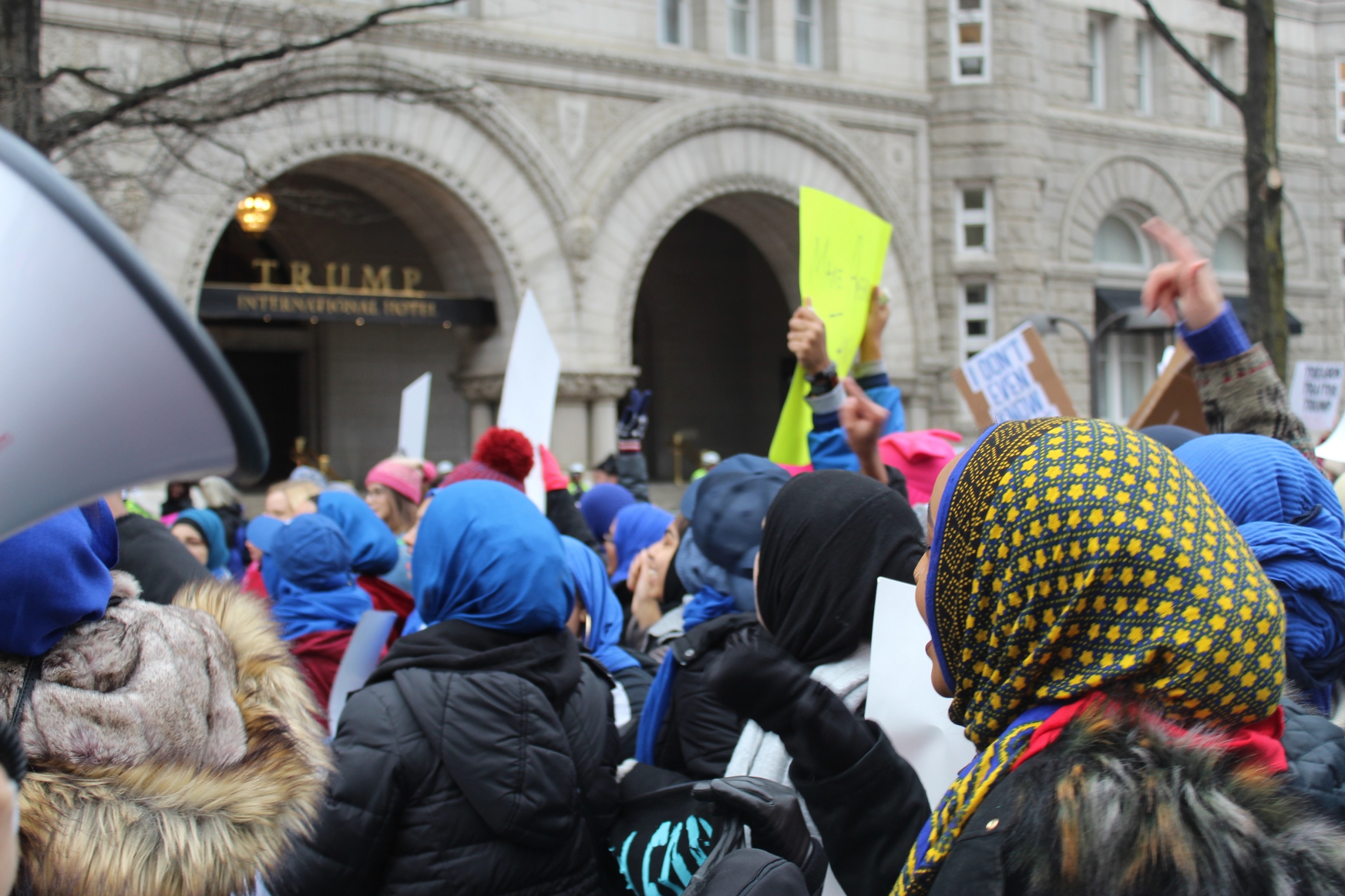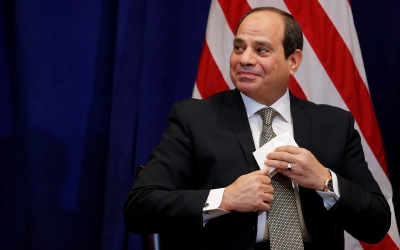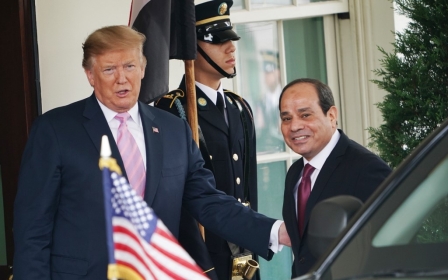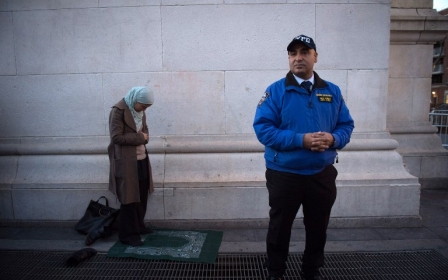Muslim Brotherhood blacklist: Trump's push threatens Muslim Americans

As Donald Trump works to designate the Muslim Brotherhood as a terrorist group, advocates in the United States say such a move will have serious implications for Muslim-American communities across the country.
Some say the designation may "jeopardise" the rights of Muslim Americans and boost Islamophobia.
It would also signal "another effort to call Muslims out and associate them with political violence", said Sally Howell, a professor of Arab American studies at the University of Michigan-Dearborn.
The US president is working to blacklist the Muslim Brotherhood, a transnational Islamist group, the New York Times reported on Tuesday, citing administration officials, including a White House spokeswoman.
The designation would debilitate the group's ability to operate internationally and open up individuals in the US who are linked to the Islamist movement to prosecution on various charges, including providing material support to a terrorist group.
New MEE newsletter: Jerusalem Dispatch
Sign up to get the latest insights and analysis on Israel-Palestine, alongside Turkey Unpacked and other MEE newsletters
'All it does is stigmatise and single out the Muslim community in a strange, unnatural, ahistorical way'
- Sally Howell, University of Michigan-Dearborn
Already, Muslim-American organisations and politicians are often called out for purported links to the Muslim Brotherhood.
Blacklisting the movement would open up these groups to greater scrutiny from the federal government and legitimise hate against Muslims, Howell said.
"To put this label 'terrorist organisation' on a group that has a very complex history serves no purpose," said Howell, who has studied the crackdown on Muslim-American charities and civil rights groups after 9/11.
"All it does is stigmatise and single out the Muslim community in a strange, unnatural, ahistorical way that jeopardises many, many Muslim-American institutions," she told Middle East Eye.
Groups targeted
One such institution may be the Council on American Islamic Relations (CAIR), which describes itself as the country's "largest Muslim civil rights and advocacy organisation".
Right-wing commentators and politicians have long accused CAIR of being a part of the Muslim Brotherhood.
Despite having dozens of chapters across the US and regularly hosting officials and cooperating with mainstream organisations, anti-Muslim activists have smeared politicians for associating with CAIR.
In 2014, the United Arab Emirates designated CAIR and the Muslim American Society, another US-based advocacy group, as terrorist organisations, placing the groups in the same category as al-Qaeda and Boko Haram militants.
'The idea of designating an entire section of society, and an entire transnational social movement, as a terrorist organisation doesn't even make sense'
- Abbas Barzegar, CAIR
That same year, the UAE and Saudi Arabia - themselves Islamic theocracies - also designated the Brotherhood as a terrorist group.
Abbas Barzegar, director of research at CAIR, said he is "confident" that the designation will not go through because the administration's legal justification for it "has no standing".
"The Muslim Brotherhood is simply a social movement. It is simply an 80-year-old network of organisations and ideas that are very different and very vast," Barzegar told MEE.
"And so, the idea of designating an entire section of society, and an entire transnational social movement, as a terrorist organisation doesn't even make sense."
Barzegar said he is counting on the Pentagon and State Department to be "smart enough" to reject the decision.
But if it does go through, he vowed that CAIR and other Muslim groups will push back against it.
"If and when something like this were to happen, the American-Muslim community is well-prepared through first and foremost its legal advocacy. We will defend American-Muslim rights - our institutions, our individuals, our families - against this kind of smear tactic," Barzegar said.
"So we will fight back. We will fight back in the media. We will fight back in politics. And we will defend ourselves according to the constitution of the United States."
Claims that CAIR is linked to the Brotherhood are false, stressed Barzegar, who said the accusation is intended to stoke Islamophobia.
The Brotherhood
Ultimately, a move by the White House to blacklist the Brotherhood would further align Trump's policies with those of Saudi Arabia, the UAE and Egypt, which have all aggressively repressed the Islamist group.
The Muslim Brotherhood was founded in 1928 by Egyptian Islamic scholar Hassan al-Banna. Despite its transnational charter, its main branch remains in Egypt, where it was banned after the 2013 coup.
The organisation says it is committed to peaceful activism. It also has politically active offshoots participating in elections in Turkey, Jordan, Lebanon, the Palestinian territories, Tunisia and Morocco.
In Egypt, the Brotherhood won the first freely held presidential election in the country's history in 2012. But President Mohamed Morsi was toppled a year later in a coup led by Abdel Fattah el-Sisi, who went on to become president.
Since then, Sisi has embarked on a widespread campaign of repression, jailing more than 50,000 activists, censoring all forms of criticism against his government, and executing hundreds of people.
During a recent visit to Washington, Sisi lobbied Trump to blacklist the Brotherhood, the NYT reported on Tuesday.
Indeed, Trump's push to blacklist the Brotherhood echoes his previously expressed admiration of the Egyptian president and depiction of political Islam as inherently violent.
The cosy relationship between the two leaders also is fuelling human rights abuses in the North African country, experts told MEE last month.
At the time, Dalia Fahmy, a political science professor at Long Island University, said that Trump is actively supporting repression in Egypt.
"I actually don't think Trump is turning a blind eye; I think what Trump is doing is actually supporting it," she told MEE.
Middle East Eye delivers independent and unrivalled coverage and analysis of the Middle East, North Africa and beyond. To learn more about republishing this content and the associated fees, please fill out this form. More about MEE can be found here.




